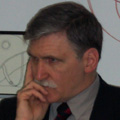 General Romeo Dallaire Lieutenant-General Dallaire (ret.) was born in Denekamp, Holland, and enrolled in the Canadian Army in 1964. He has held various command, staff and training appointments in Canada and Germany. He was promoted to the rank of Brigadier-General on July 3, 1989, and on July 1, 1993 took command of the UN Observer Mission - Uganda and Rwanda (UNOMUR) and the UN Assistance Mission for Rwanda (UNAMIR). It is for this mission that he was awarded the Meritorious Service Cross. He was promoted to Major General on January 1, 1994 and from September 1994 to October 1995, he assumed simultaneously the positions of Deputy Commander of Land Force Command in St. Hubert and Commander of the 1st Canadian Division. On June 2, 1995, the Conference of Defence Associations presented him with "The Vimy Award". Promoted to Lieutenant General, he assumed the duties of Assistant Deputy Minister (Human Resources-Military) in April 1998. He retired from the Canadian army in 2000 and is now special advisor to the Canadian Ministry of Defence on child soldiers. He is the author of Shake Hands with the Devil: The Failure of Humanity in the Rwandan Genocide. The inaugural Aegis Award for Genocide Prevention was presented to Romeo Dallaire in January 2002 for demonstrating "altruism, resourcefulness and bravery in preserving the value of human life."
General Romeo Dallaire Lieutenant-General Dallaire (ret.) was born in Denekamp, Holland, and enrolled in the Canadian Army in 1964. He has held various command, staff and training appointments in Canada and Germany. He was promoted to the rank of Brigadier-General on July 3, 1989, and on July 1, 1993 took command of the UN Observer Mission - Uganda and Rwanda (UNOMUR) and the UN Assistance Mission for Rwanda (UNAMIR). It is for this mission that he was awarded the Meritorious Service Cross. He was promoted to Major General on January 1, 1994 and from September 1994 to October 1995, he assumed simultaneously the positions of Deputy Commander of Land Force Command in St. Hubert and Commander of the 1st Canadian Division. On June 2, 1995, the Conference of Defence Associations presented him with "The Vimy Award". Promoted to Lieutenant General, he assumed the duties of Assistant Deputy Minister (Human Resources-Military) in April 1998. He retired from the Canadian army in 2000 and is now special advisor to the Canadian Ministry of Defence on child soldiers. He is the author of Shake Hands with the Devil: The Failure of Humanity in the Rwandan Genocide. The inaugural Aegis Award for Genocide Prevention was presented to Romeo Dallaire in January 2002 for demonstrating "altruism, resourcefulness and bravery in preserving the value of human life."
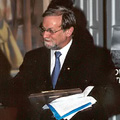 Gareth Evans Gareth Evans is President and Chief Executive of the Brussels-based International Crisis Group (ICG) positions he assumed in January 2000. He was also appointed, in September 2000, Co-Chair of the International Commission on Intervention and State Sovereignty. In January 2001, he received the Order of Australia. In 1999, he resigned from the Australian Parliament, after 21 years of service. He was the longest serving parliamentary member of the Australian Labor Party, first entering the Senate in 1978 and transferring to the House of Representatives in 1996. Gareth Evans served as a Cabinet Minister in the Hawke and Keating Labor Governments in the posts of Attorney-General (1983-4), Minister for Resources and Energy (1984-7), Minister for Transport and Communications (1987-8) and Foreign Minister (1988- 96). He is best known internationally as Foreign Minister for his role in founding APEC in 1989, for developing the UN Peace Plan for Cambodia, for bringing to a conclusion the international Chemical Weapons Convention, for initiating the Canberra Commission on the Elimination of Nuclear Weapons, and for his 1993 book on UN reform Cooperating for Peace.
Gareth Evans Gareth Evans is President and Chief Executive of the Brussels-based International Crisis Group (ICG) positions he assumed in January 2000. He was also appointed, in September 2000, Co-Chair of the International Commission on Intervention and State Sovereignty. In January 2001, he received the Order of Australia. In 1999, he resigned from the Australian Parliament, after 21 years of service. He was the longest serving parliamentary member of the Australian Labor Party, first entering the Senate in 1978 and transferring to the House of Representatives in 1996. Gareth Evans served as a Cabinet Minister in the Hawke and Keating Labor Governments in the posts of Attorney-General (1983-4), Minister for Resources and Energy (1984-7), Minister for Transport and Communications (1987-8) and Foreign Minister (1988- 96). He is best known internationally as Foreign Minister for his role in founding APEC in 1989, for developing the UN Peace Plan for Cambodia, for bringing to a conclusion the international Chemical Weapons Convention, for initiating the Canberra Commission on the Elimination of Nuclear Weapons, and for his 1993 book on UN reform Cooperating for Peace.
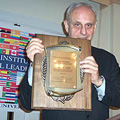 Leslie H. Gelb (Tufts '59) Leslie H. Gelb is the President of the Council on Foreign Relations. He is also a Pulitzer Prize winner and former correspondent for the New York Times. He has worked as a Director in the Department of Defense, as a former government official in political and military affairs, and he is author of several books on American alliances and foreign policy. Gelb's expertise lies in issues of general U.S. foreign policy; national security; Russia; Middle East; and the Persian Gulf. Gelb's career at the New York Times began in 1981 and carried through 1993. There he held positions as a Columnist, Deputy Editorial Page Editor, Op-Ed Page Editor, National Security Correspondent, and Diplomatic Correspondent. Prior to that, he was a Senior Associate at the Carnegie Endowment (1980-81); Assistant Secretary of State for Political/Military Affairs (1977-79); Senior Fellow, Brookings (1969-73); Visiting Professor, Georgetown University (1969-73); Director of Policy Planning and Arms Control for International Security Affairs, Department of Defense (1967-69); and Executive Assistant, U.S. Senator Jacob K. Javits (1966-67). His honors include Pulitzer Prize in Explanatory Journalism (1986); American Political Science Association (APSA) Woodrow Wilson Award for the best book on international relations (1981), and Fellow, American Academy of Arts and Sciences. When Gelb was at the U.S. Department of Defense, he earned the Pentagon's highest award, the "Distinguished Service Award."
Leslie H. Gelb (Tufts '59) Leslie H. Gelb is the President of the Council on Foreign Relations. He is also a Pulitzer Prize winner and former correspondent for the New York Times. He has worked as a Director in the Department of Defense, as a former government official in political and military affairs, and he is author of several books on American alliances and foreign policy. Gelb's expertise lies in issues of general U.S. foreign policy; national security; Russia; Middle East; and the Persian Gulf. Gelb's career at the New York Times began in 1981 and carried through 1993. There he held positions as a Columnist, Deputy Editorial Page Editor, Op-Ed Page Editor, National Security Correspondent, and Diplomatic Correspondent. Prior to that, he was a Senior Associate at the Carnegie Endowment (1980-81); Assistant Secretary of State for Political/Military Affairs (1977-79); Senior Fellow, Brookings (1969-73); Visiting Professor, Georgetown University (1969-73); Director of Policy Planning and Arms Control for International Security Affairs, Department of Defense (1967-69); and Executive Assistant, U.S. Senator Jacob K. Javits (1966-67). His honors include Pulitzer Prize in Explanatory Journalism (1986); American Political Science Association (APSA) Woodrow Wilson Award for the best book on international relations (1981), and Fellow, American Academy of Arts and Sciences. When Gelb was at the U.S. Department of Defense, he earned the Pentagon's highest award, the "Distinguished Service Award."
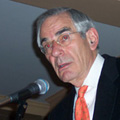 David Halberstam David Halberstam is a legendary figure in American journalism. His landmark trilogy of books on power in America, The Best and the Brightest, The Powers That Be, and The Reckoning have helped define the latter part of this century more than any journalistic works, and have won him innumerable awards as well as broad critical acclaim. His last 13 books have been New York Times Best Sellers. The breadth of Halberstam's work is demonstrated by the vastly different subjects of two of his books that were number one on the best sellers list: The Best and the Brightest, and 17 years later, Summer of '49, a nostalgic look at a pennant race -- and a very different America -- which existed forty years ago. In 1998, Halberstam released The Children, which chronicles the lives of eight young, courageous civil rights activists he met in 1960 as a reporter for The Nashville Tennessean. His September 2001 release War in a Time of Peace: Bush, Clinton, and the Generals, revealed how post Cold war U.S. foreign policy has been haunted by the legacy of Vietnam. His latest national best seller is Firehouse, a moving portrait of the brave men of Engine 40, Ladder 35 in Manhattan, which lost 12 of its 13 firefighters in the attacks on the World Trade Center on 9/11. David Halberstam began his career as the one reporter on the Daily Times Leader in West Point, Mississippi and later at The Nashville Tennessean before joining The New York Times in 1960. He first came to national prominence in the early sixties as part of a small handful of American reporters who refused to accept the official optimism about Vietnam and who reported that the war was being lost. At the age of 30, for his reporting on Vietnam, David Halberstam was awarded The Pulitzer Prize. Harper's Magazine has called Halberstam "a legend in American journalism."
David Halberstam David Halberstam is a legendary figure in American journalism. His landmark trilogy of books on power in America, The Best and the Brightest, The Powers That Be, and The Reckoning have helped define the latter part of this century more than any journalistic works, and have won him innumerable awards as well as broad critical acclaim. His last 13 books have been New York Times Best Sellers. The breadth of Halberstam's work is demonstrated by the vastly different subjects of two of his books that were number one on the best sellers list: The Best and the Brightest, and 17 years later, Summer of '49, a nostalgic look at a pennant race -- and a very different America -- which existed forty years ago. In 1998, Halberstam released The Children, which chronicles the lives of eight young, courageous civil rights activists he met in 1960 as a reporter for The Nashville Tennessean. His September 2001 release War in a Time of Peace: Bush, Clinton, and the Generals, revealed how post Cold war U.S. foreign policy has been haunted by the legacy of Vietnam. His latest national best seller is Firehouse, a moving portrait of the brave men of Engine 40, Ladder 35 in Manhattan, which lost 12 of its 13 firefighters in the attacks on the World Trade Center on 9/11. David Halberstam began his career as the one reporter on the Daily Times Leader in West Point, Mississippi and later at The Nashville Tennessean before joining The New York Times in 1960. He first came to national prominence in the early sixties as part of a small handful of American reporters who refused to accept the official optimism about Vietnam and who reported that the war was being lost. At the age of 30, for his reporting on Vietnam, David Halberstam was awarded The Pulitzer Prize. Harper's Magazine has called Halberstam "a legend in American journalism."
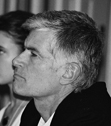 James Nachtwey James Nachtwey grew up in Massachusetts and studied Art History and Political Science in college. Images from the Vietnam War and the American Civil Rights movement had a powerful effect on him and were instrumental in his decision to become a photographer. He has worked aboard ships in the Merchant Marine, and while teaching himself photography, he was an apprentice news film editor and a truck driver. In 1976 he started work as a newspaper photographer in New Mexico, and in 1980, he moved to New York to begin a career as a freelance magazine photographer. His first foreign assignment was to cover civil strife in Northern Ireland in 1981 during the IRA hunger strike. Since then, Nachtwey has devoted himself to documenting wars, conflicts and critical social issues. He has worked on extensive photographic essays in El Salvador, Nicaragua, Guatemala, Lebanon, the West Bank and Gaza, Israel, Indonesia, Thailand, India, Sri Lanka, Afghanistan, the Philippines, South Korea, Somalia, Sudan, Rwanda, South Africa, Russia, Bosnia, Chechnya, Kosovo, Romania, Brazil and the United States. Nachtwey has been a contract photographer with Time Magazine since 1984. He was associated with Black Star from 1980-85 and was a member of Magnum from 1986 until 2001. He has had solo exhibitions at the International Center of Photography in New York, the Palazzo Esposizione in Rome, El Circulo de Bellas Artes in Madrid, the Carolinum in Prague, the Hasselblad Center in Sweden, the Canon Gallery and the Nieuwe Kerk in Amsterdam, and the Hood Museum of Art at Dartmouth College, among others. He has received numerous honors such as the Robert Capa Gold Medal (five times), the World Press Photo Award twice, Magazine Photographer of the Year (six times), the International Center of Photography Infinity Award three times, the Leica Award twice, the Bayeaux Award for War Correspondents (twice), the Alfred Eisenstaedt Award, the Canon Photo essayist Award and the W. Eugene Smith Memorial Grant in Humanistic Photography.
James Nachtwey James Nachtwey grew up in Massachusetts and studied Art History and Political Science in college. Images from the Vietnam War and the American Civil Rights movement had a powerful effect on him and were instrumental in his decision to become a photographer. He has worked aboard ships in the Merchant Marine, and while teaching himself photography, he was an apprentice news film editor and a truck driver. In 1976 he started work as a newspaper photographer in New Mexico, and in 1980, he moved to New York to begin a career as a freelance magazine photographer. His first foreign assignment was to cover civil strife in Northern Ireland in 1981 during the IRA hunger strike. Since then, Nachtwey has devoted himself to documenting wars, conflicts and critical social issues. He has worked on extensive photographic essays in El Salvador, Nicaragua, Guatemala, Lebanon, the West Bank and Gaza, Israel, Indonesia, Thailand, India, Sri Lanka, Afghanistan, the Philippines, South Korea, Somalia, Sudan, Rwanda, South Africa, Russia, Bosnia, Chechnya, Kosovo, Romania, Brazil and the United States. Nachtwey has been a contract photographer with Time Magazine since 1984. He was associated with Black Star from 1980-85 and was a member of Magnum from 1986 until 2001. He has had solo exhibitions at the International Center of Photography in New York, the Palazzo Esposizione in Rome, El Circulo de Bellas Artes in Madrid, the Carolinum in Prague, the Hasselblad Center in Sweden, the Canon Gallery and the Nieuwe Kerk in Amsterdam, and the Hood Museum of Art at Dartmouth College, among others. He has received numerous honors such as the Robert Capa Gold Medal (five times), the World Press Photo Award twice, Magazine Photographer of the Year (six times), the International Center of Photography Infinity Award three times, the Leica Award twice, the Bayeaux Award for War Correspondents (twice), the Alfred Eisenstaedt Award, the Canon Photo essayist Award and the W. Eugene Smith Memorial Grant in Humanistic Photography.
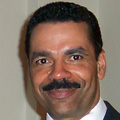 Ronald K. Noble Ronald K. Noble currently serves as the Secretary General of Interpol. Nominated by the Interpol Executive Committee in July 1999, and confirmed by the 69th General Assembly on November 2nd 2000, Noble has extensive international law enforcement expertise. Prior to his Interpol appointment, Noble held a post as Professor of Law at the New York University School of Law. His law enforcement career includes service in both the US Department of Justice and Treasury. In addition to service as an Assistant US Attorney and Deputy Assistant Attorney General, he more recently was Chief Law Enforcement Officer in the US Treasury Department from 1989 to 1996. In this position, he had command overseeing several of the largest law enforcement agencies in the United States: The Secret Service, the Customs Service, the Bureau of Alcohol, Tobacco and Firearms, the Federal Law Enforcement Training Center, the Financial Crimes Enforcement Network, the Office of Foreign Assets Control, and the Criminal Investigation Division of the Internal Revenue Service. A former member of Interpol's Executive Committee, Noble has also been President of the 26 national Financial Action Task Force, the anti-money laundering organization established by the G7 in 1989.
Ronald K. Noble Ronald K. Noble currently serves as the Secretary General of Interpol. Nominated by the Interpol Executive Committee in July 1999, and confirmed by the 69th General Assembly on November 2nd 2000, Noble has extensive international law enforcement expertise. Prior to his Interpol appointment, Noble held a post as Professor of Law at the New York University School of Law. His law enforcement career includes service in both the US Department of Justice and Treasury. In addition to service as an Assistant US Attorney and Deputy Assistant Attorney General, he more recently was Chief Law Enforcement Officer in the US Treasury Department from 1989 to 1996. In this position, he had command overseeing several of the largest law enforcement agencies in the United States: The Secret Service, the Customs Service, the Bureau of Alcohol, Tobacco and Firearms, the Federal Law Enforcement Training Center, the Financial Crimes Enforcement Network, the Office of Foreign Assets Control, and the Criminal Investigation Division of the Internal Revenue Service. A former member of Interpol's Executive Committee, Noble has also been President of the 26 national Financial Action Task Force, the anti-money laundering organization established by the G7 in 1989.
 Mary Robinson Mary Robinson is currently the Director of the Ethical Globalization Initiative, which seeks to integrate human rights norms and standards into a more ethical globalization process and to support local and national human rights capacity building. Mrs. Robinson was the United Nations High Commissioner for Human Rights from 1997-2002, assuming responsibility for the UN human rights program at a time of great change. Under her leadership, the Office prepared to better face existing and emerging human rights challenges, harnessing the energies of new actors in the global quest for a universal culture of respect for fundamental rights and freedoms. As High Commissioner, Mrs. Robinson gave priority to implementing the reform proposal of Secretary-General Kofi Annan to integrate human rights concerns in all the activities of the United Nations. In September 1998, she was the first High Commissioner to visit China. Mrs. Robinson also strengthened human rights monitoring in such conflict areas as Kosovo, in the Federal Republic of Yugoslavia. Mrs. Robinson came to the United Nations after a distinguished seven year tenure as President of Ireland. As President, Mrs. Robinson developed a new sense of Ireland's economic, political and cultural links with other countries and cultures. She placed special emphasis during her Presidency on the needs of developing countries, linking the history of the Great Irish Famine to today's nutrition, poverty and policy issues, thus creating a bridge of partnership between developed and developing countries. Mrs. Robinson was the first Head of State to visit Rwanda in the aftermath of the 1994 genocide there. She was also the first Head of State to visit Somalia following the crisis there in 1992, receiving the CARE Humanitarian Award in recognition of her efforts for that country.
Mary Robinson Mary Robinson is currently the Director of the Ethical Globalization Initiative, which seeks to integrate human rights norms and standards into a more ethical globalization process and to support local and national human rights capacity building. Mrs. Robinson was the United Nations High Commissioner for Human Rights from 1997-2002, assuming responsibility for the UN human rights program at a time of great change. Under her leadership, the Office prepared to better face existing and emerging human rights challenges, harnessing the energies of new actors in the global quest for a universal culture of respect for fundamental rights and freedoms. As High Commissioner, Mrs. Robinson gave priority to implementing the reform proposal of Secretary-General Kofi Annan to integrate human rights concerns in all the activities of the United Nations. In September 1998, she was the first High Commissioner to visit China. Mrs. Robinson also strengthened human rights monitoring in such conflict areas as Kosovo, in the Federal Republic of Yugoslavia. Mrs. Robinson came to the United Nations after a distinguished seven year tenure as President of Ireland. As President, Mrs. Robinson developed a new sense of Ireland's economic, political and cultural links with other countries and cultures. She placed special emphasis during her Presidency on the needs of developing countries, linking the history of the Great Irish Famine to today's nutrition, poverty and policy issues, thus creating a bridge of partnership between developed and developing countries. Mrs. Robinson was the first Head of State to visit Rwanda in the aftermath of the 1994 genocide there. She was also the first Head of State to visit Somalia following the crisis there in 1992, receiving the CARE Humanitarian Award in recognition of her efforts for that country.
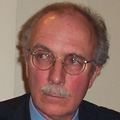 Amb. John Shattuck John Shattuck is an officer of the John F. Kennedy Library Foundation in 2001. Mr. Shattuck's career spans nearly three decades in government service and the nonprofit sector. In 1993, he was nominated by President Clinton and confirmed by the U.S. Senate as Assistant Secretary of State for Democracy, Human Rights and Labor. While serving in this position, Mr. Shattuck worked to end the war in Bosnia and negotiate the Dayton Peace Agreement; establish the International Criminal Tribunals for the former Yugoslavia and Rwanda; restore a democratically-elected government to Haiti; administer U.S. assistance to new and emerging democracies; and raise the profile of human rights in U.S. foreign policy after the end of the Cold War. For this work, he received an International Human Rights Award from the United Nations Association of Boston in 1998. Mr. Shattuck is also the author of Freedom on Fire: Human Rights Wars and the Roots of Terrorism, to be published by Harvard University Press in 2003. In 1998, Mr. Shattuck was nominated by President Clinton and confirmed by the Senate to serve as U.S. Ambassador to the Czech Republic. Before entering government service, Mr. Shattuck was at Harvard University, where he held the position of vice president for government, community and public affairs from 1984 to 1993. He also lectured on civil liberties at the Harvard Law School and the Kennedy School of Government. Mr. Shattuck's public service career began at the American Civil Liberties Union, where he was Executive Director of the ACLU Washington office and national staff counsel from 1971 to 1984. He was involved in all major civil-rights and civil-liberties issues during the Nixon, Ford, Carter, and Reagan administrations, including the defense of federal civil-rights legislation, protection of the federal courts against congressional efforts to limit their jurisdiction, and legislative expansion of the rights of women.
Amb. John Shattuck John Shattuck is an officer of the John F. Kennedy Library Foundation in 2001. Mr. Shattuck's career spans nearly three decades in government service and the nonprofit sector. In 1993, he was nominated by President Clinton and confirmed by the U.S. Senate as Assistant Secretary of State for Democracy, Human Rights and Labor. While serving in this position, Mr. Shattuck worked to end the war in Bosnia and negotiate the Dayton Peace Agreement; establish the International Criminal Tribunals for the former Yugoslavia and Rwanda; restore a democratically-elected government to Haiti; administer U.S. assistance to new and emerging democracies; and raise the profile of human rights in U.S. foreign policy after the end of the Cold War. For this work, he received an International Human Rights Award from the United Nations Association of Boston in 1998. Mr. Shattuck is also the author of Freedom on Fire: Human Rights Wars and the Roots of Terrorism, to be published by Harvard University Press in 2003. In 1998, Mr. Shattuck was nominated by President Clinton and confirmed by the Senate to serve as U.S. Ambassador to the Czech Republic. Before entering government service, Mr. Shattuck was at Harvard University, where he held the position of vice president for government, community and public affairs from 1984 to 1993. He also lectured on civil liberties at the Harvard Law School and the Kennedy School of Government. Mr. Shattuck's public service career began at the American Civil Liberties Union, where he was Executive Director of the ACLU Washington office and national staff counsel from 1971 to 1984. He was involved in all major civil-rights and civil-liberties issues during the Nixon, Ford, Carter, and Reagan administrations, including the defense of federal civil-rights legislation, protection of the federal courts against congressional efforts to limit their jurisdiction, and legislative expansion of the rights of women.
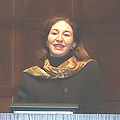 Anne-Marie Slaughter Anne-Marie Slaughter is Dean of the Woodrow Wilson School of Public and International Affairs at Princeton University. She is also president of the American Society of International Law. Prior to becoming dean, she was the J. Sinclair Armstrong Professor of International, Foreign and Comparative Law and director of Graduate and International Legal Studies at Harvard Law School. She is a fellow of the American Academy of Arts and Sciences and a member of the Council on Foreign Relations. Dean Slaughter writes and lectures widely on international law and foreign policy issues. She has written over 50 articles and edited or written four books, on subjects such as the effectiveness of international courts and tribunals, the legal dimensions of the war on terrorism, building global democracy, international law and international relations theory, and compliance with international rules. Her article "The Real New World Order," originally published in the 75th anniversary issue of Foreign Affairs , is now widely taught in colleges and universities. Her book on that same subject -- global governance through networks of national government officials -- is forthcoming from Princeton University Press. In the summer of 2000, Dean Slaughter delivered a series of lectures on international law and international relations as part of the millennial lectures at the Hague Academy of International Law. She has been a frequent media commentator and op-ed contributor on international tribunals, terrorism, and international law.
Anne-Marie Slaughter Anne-Marie Slaughter is Dean of the Woodrow Wilson School of Public and International Affairs at Princeton University. She is also president of the American Society of International Law. Prior to becoming dean, she was the J. Sinclair Armstrong Professor of International, Foreign and Comparative Law and director of Graduate and International Legal Studies at Harvard Law School. She is a fellow of the American Academy of Arts and Sciences and a member of the Council on Foreign Relations. Dean Slaughter writes and lectures widely on international law and foreign policy issues. She has written over 50 articles and edited or written four books, on subjects such as the effectiveness of international courts and tribunals, the legal dimensions of the war on terrorism, building global democracy, international law and international relations theory, and compliance with international rules. Her article "The Real New World Order," originally published in the 75th anniversary issue of Foreign Affairs , is now widely taught in colleges and universities. Her book on that same subject -- global governance through networks of national government officials -- is forthcoming from Princeton University Press. In the summer of 2000, Dean Slaughter delivered a series of lectures on international law and international relations as part of the millennial lectures at the Hague Academy of International Law. She has been a frequent media commentator and op-ed contributor on international tribunals, terrorism, and international law.
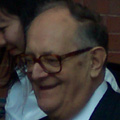 Cornelio Sommaruga Cornelio Sommaruga was the President of the International Committee of the Red Cross from 1987 to 1999. Cornelio Sommaruga was born in Rome in 1932. A Swiss citizen from Lugano (Ticino), he entered the service of the Swiss Confederation in 1960 and held various diplomatic posts within the Federal Department of Foreign Affairs until 1973, when he was appointed Deputy Secretary-General of the European Free Trade Association (EFTA) in Geneva. Three years later he joined the staff of the Swiss Federal Office for External Economic Affairs in Bern, where he served first as Ambassador, then as Delegate for Trade Agreements, before being appointed Secretary of State for External Economic Affairs in 1984. After retiring as President of the ICRC, he served as a Member of the Panel on UN Peace Operations and as a Member of the International Commission on Intervention and State Sovereignty. Currently, he is President of the Foundation Caux-Initiatives of Change (Moral Re-Armament); President of the Geneva International Centre for Humanitarian Demining (GICHD); Chairman of the Karl Popper Foundation; Member of the Board of the Open Society Institute in Budapest; and Chairman of the Board of JP Morgan (Suisse) SA.
Cornelio Sommaruga Cornelio Sommaruga was the President of the International Committee of the Red Cross from 1987 to 1999. Cornelio Sommaruga was born in Rome in 1932. A Swiss citizen from Lugano (Ticino), he entered the service of the Swiss Confederation in 1960 and held various diplomatic posts within the Federal Department of Foreign Affairs until 1973, when he was appointed Deputy Secretary-General of the European Free Trade Association (EFTA) in Geneva. Three years later he joined the staff of the Swiss Federal Office for External Economic Affairs in Bern, where he served first as Ambassador, then as Delegate for Trade Agreements, before being appointed Secretary of State for External Economic Affairs in 1984. After retiring as President of the ICRC, he served as a Member of the Panel on UN Peace Operations and as a Member of the International Commission on Intervention and State Sovereignty. Currently, he is President of the Foundation Caux-Initiatives of Change (Moral Re-Armament); President of the Geneva International Centre for Humanitarian Demining (GICHD); Chairman of the Karl Popper Foundation; Member of the Board of the Open Society Institute in Budapest; and Chairman of the Board of JP Morgan (Suisse) SA.
General Romeo Dallaire Lieutenant-General Dallaire (ret.) was born in Denekamp, Holland, and enrolled in the Canadian Army in 1964. He has held various command, staff and training appointments in Canada and Germany. He was promoted to the rank of Brigadier-General on July 3, 1989, and on July 1, 1993 took command of the UN Observer Mission - Uganda and Rwanda (UNOMUR) and the UN Assistance Mission for Rwanda (UNAMIR). It is for this mission that he was awarded the Meritorious Service Cross. He was promoted to Major General on January 1, 1994 and from September 1994 to October 1995, he assumed simultaneously the positions of Deputy Commander of Land Force Command in St. Hubert and Commander of the 1st Canadian Division. On June 2, 1995, the Conference of Defence Associations presented him with "The Vimy Award". Promoted to Lieutenant General, he assumed the duties of Assistant Deputy Minister (Human Resources-Military) in April 1998. He retired from the Canadian army in 2000 and is now special advisor to the Canadian Ministry of Defence on child soldiers. He is the author of Shake Hands with the Devil: The Failure of Humanity in the Rwandan Genocide. The inaugural Aegis Award for Genocide Prevention was presented to Romeo Dallaire in January 2002 for demonstrating "altruism, resourcefulness and bravery in preserving the value of human life."
Gareth Evans Gareth Evans is President and Chief Executive of the Brussels-based International Crisis Group (ICG) positions he assumed in January 2000. He was also appointed, in September 2000, Co-Chair of the International Commission on Intervention and State Sovereignty. In January 2001, he received the Order of Australia. In 1999, he resigned from the Australian Parliament, after 21 years of service. He was the longest serving parliamentary member of the Australian Labor Party, first entering the Senate in 1978 and transferring to the House of Representatives in 1996. Gareth Evans served as a Cabinet Minister in the Hawke and Keating Labor Governments in the posts of Attorney-General (1983-4), Minister for Resources and Energy (1984-7), Minister for Transport and Communications (1987-8) and Foreign Minister (1988- 96). He is best known internationally as Foreign Minister for his role in founding APEC in 1989, for developing the UN Peace Plan for Cambodia, for bringing to a conclusion the international Chemical Weapons Convention, for initiating the Canberra Commission on the Elimination of Nuclear Weapons, and for his 1993 book on UN reform Cooperating for Peace.
Leslie H. Gelb (Tufts '59) Leslie H. Gelb is the President of the Council on Foreign Relations. He is also a Pulitzer Prize winner and former correspondent for the New York Times. He has worked as a Director in the Department of Defense, as a former government official in political and military affairs, and he is author of several books on American alliances and foreign policy. Gelb's expertise lies in issues of general U.S. foreign policy; national security; Russia; Middle East; and the Persian Gulf. Gelb's career at the New York Times began in 1981 and carried through 1993. There he held positions as a Columnist, Deputy Editorial Page Editor, Op-Ed Page Editor, National Security Correspondent, and Diplomatic Correspondent. Prior to that, he was a Senior Associate at the Carnegie Endowment (1980-81); Assistant Secretary of State for Political/Military Affairs (1977-79); Senior Fellow, Brookings (1969-73); Visiting Professor, Georgetown University (1969-73); Director of Policy Planning and Arms Control for International Security Affairs, Department of Defense (1967-69); and Executive Assistant, U.S. Senator Jacob K. Javits (1966-67). His honors include Pulitzer Prize in Explanatory Journalism (1986); American Political Science Association (APSA) Woodrow Wilson Award for the best book on international relations (1981), and Fellow, American Academy of Arts and Sciences. When Gelb was at the U.S. Department of Defense, he earned the Pentagon's highest award, the "Distinguished Service Award."
David Halberstam David Halberstam is a legendary figure in American journalism. His landmark trilogy of books on power in America, The Best and the Brightest, The Powers That Be, and The Reckoning have helped define the latter part of this century more than any journalistic works, and have won him innumerable awards as well as broad critical acclaim. His last 13 books have been New York Times Best Sellers. The breadth of Halberstam's work is demonstrated by the vastly different subjects of two of his books that were number one on the best sellers list: The Best and the Brightest, and 17 years later, Summer of '49, a nostalgic look at a pennant race -- and a very different America -- which existed forty years ago. In 1998, Halberstam released The Children, which chronicles the lives of eight young, courageous civil rights activists he met in 1960 as a reporter for The Nashville Tennessean. His September 2001 release War in a Time of Peace: Bush, Clinton, and the Generals, revealed how post Cold war U.S. foreign policy has been haunted by the legacy of Vietnam. His latest national best seller is Firehouse, a moving portrait of the brave men of Engine 40, Ladder 35 in Manhattan, which lost 12 of its 13 firefighters in the attacks on the World Trade Center on 9/11. David Halberstam began his career as the one reporter on the Daily Times Leader in West Point, Mississippi and later at The Nashville Tennessean before joining The New York Times in 1960. He first came to national prominence in the early sixties as part of a small handful of American reporters who refused to accept the official optimism about Vietnam and who reported that the war was being lost. At the age of 30, for his reporting on Vietnam, David Halberstam was awarded The Pulitzer Prize. Harper's Magazine has called Halberstam "a legend in American journalism."
James Nachtwey James Nachtwey grew up in Massachusetts and studied Art History and Political Science in college. Images from the Vietnam War and the American Civil Rights movement had a powerful effect on him and were instrumental in his decision to become a photographer. He has worked aboard ships in the Merchant Marine, and while teaching himself photography, he was an apprentice news film editor and a truck driver. In 1976 he started work as a newspaper photographer in New Mexico, and in 1980, he moved to New York to begin a career as a freelance magazine photographer. His first foreign assignment was to cover civil strife in Northern Ireland in 1981 during the IRA hunger strike. Since then, Nachtwey has devoted himself to documenting wars, conflicts and critical social issues. He has worked on extensive photographic essays in El Salvador, Nicaragua, Guatemala, Lebanon, the West Bank and Gaza, Israel, Indonesia, Thailand, India, Sri Lanka, Afghanistan, the Philippines, South Korea, Somalia, Sudan, Rwanda, South Africa, Russia, Bosnia, Chechnya, Kosovo, Romania, Brazil and the United States. Nachtwey has been a contract photographer with Time Magazine since 1984. He was associated with Black Star from 1980-85 and was a member of Magnum from 1986 until 2001. He has had solo exhibitions at the International Center of Photography in New York, the Palazzo Esposizione in Rome, El Circulo de Bellas Artes in Madrid, the Carolinum in Prague, the Hasselblad Center in Sweden, the Canon Gallery and the Nieuwe Kerk in Amsterdam, and the Hood Museum of Art at Dartmouth College, among others. He has received numerous honors such as the Robert Capa Gold Medal (five times), the World Press Photo Award twice, Magazine Photographer of the Year (six times), the International Center of Photography Infinity Award three times, the Leica Award twice, the Bayeaux Award for War Correspondents (twice), the Alfred Eisenstaedt Award, the Canon Photo essayist Award and the W. Eugene Smith Memorial Grant in Humanistic Photography.
Ronald K. Noble Ronald K. Noble currently serves as the Secretary General of Interpol. Nominated by the Interpol Executive Committee in July 1999, and confirmed by the 69th General Assembly on November 2nd 2000, Noble has extensive international law enforcement expertise. Prior to his Interpol appointment, Noble held a post as Professor of Law at the New York University School of Law. His law enforcement career includes service in both the US Department of Justice and Treasury. In addition to service as an Assistant US Attorney and Deputy Assistant Attorney General, he more recently was Chief Law Enforcement Officer in the US Treasury Department from 1989 to 1996. In this position, he had command overseeing several of the largest law enforcement agencies in the United States: The Secret Service, the Customs Service, the Bureau of Alcohol, Tobacco and Firearms, the Federal Law Enforcement Training Center, the Financial Crimes Enforcement Network, the Office of Foreign Assets Control, and the Criminal Investigation Division of the Internal Revenue Service. A former member of Interpol's Executive Committee, Noble has also been President of the 26 national Financial Action Task Force, the anti-money laundering organization established by the G7 in 1989.
Mary Robinson Mary Robinson is currently the Director of the Ethical Globalization Initiative, which seeks to integrate human rights norms and standards into a more ethical globalization process and to support local and national human rights capacity building. Mrs. Robinson was the United Nations High Commissioner for Human Rights from 1997-2002, assuming responsibility for the UN human rights program at a time of great change. Under her leadership, the Office prepared to better face existing and emerging human rights challenges, harnessing the energies of new actors in the global quest for a universal culture of respect for fundamental rights and freedoms. As High Commissioner, Mrs. Robinson gave priority to implementing the reform proposal of Secretary-General Kofi Annan to integrate human rights concerns in all the activities of the United Nations. In September 1998, she was the first High Commissioner to visit China. Mrs. Robinson also strengthened human rights monitoring in such conflict areas as Kosovo, in the Federal Republic of Yugoslavia. Mrs. Robinson came to the United Nations after a distinguished seven year tenure as President of Ireland. As President, Mrs. Robinson developed a new sense of Ireland's economic, political and cultural links with other countries and cultures. She placed special emphasis during her Presidency on the needs of developing countries, linking the history of the Great Irish Famine to today's nutrition, poverty and policy issues, thus creating a bridge of partnership between developed and developing countries. Mrs. Robinson was the first Head of State to visit Rwanda in the aftermath of the 1994 genocide there. She was also the first Head of State to visit Somalia following the crisis there in 1992, receiving the CARE Humanitarian Award in recognition of her efforts for that country.
Amb. John Shattuck John Shattuck is an officer of the John F. Kennedy Library Foundation in 2001. Mr. Shattuck's career spans nearly three decades in government service and the nonprofit sector. In 1993, he was nominated by President Clinton and confirmed by the U.S. Senate as Assistant Secretary of State for Democracy, Human Rights and Labor. While serving in this position, Mr. Shattuck worked to end the war in Bosnia and negotiate the Dayton Peace Agreement; establish the International Criminal Tribunals for the former Yugoslavia and Rwanda; restore a democratically-elected government to Haiti; administer U.S. assistance to new and emerging democracies; and raise the profile of human rights in U.S. foreign policy after the end of the Cold War. For this work, he received an International Human Rights Award from the United Nations Association of Boston in 1998. Mr. Shattuck is also the author of Freedom on Fire: Human Rights Wars and the Roots of Terrorism, to be published by Harvard University Press in 2003. In 1998, Mr. Shattuck was nominated by President Clinton and confirmed by the Senate to serve as U.S. Ambassador to the Czech Republic. Before entering government service, Mr. Shattuck was at Harvard University, where he held the position of vice president for government, community and public affairs from 1984 to 1993. He also lectured on civil liberties at the Harvard Law School and the Kennedy School of Government. Mr. Shattuck's public service career began at the American Civil Liberties Union, where he was Executive Director of the ACLU Washington office and national staff counsel from 1971 to 1984. He was involved in all major civil-rights and civil-liberties issues during the Nixon, Ford, Carter, and Reagan administrations, including the defense of federal civil-rights legislation, protection of the federal courts against congressional efforts to limit their jurisdiction, and legislative expansion of the rights of women.
Anne-Marie Slaughter Anne-Marie Slaughter is Dean of the Woodrow Wilson School of Public and International Affairs at Princeton University. She is also president of the American Society of International Law. Prior to becoming dean, she was the J. Sinclair Armstrong Professor of International, Foreign and Comparative Law and director of Graduate and International Legal Studies at Harvard Law School. She is a fellow of the American Academy of Arts and Sciences and a member of the Council on Foreign Relations. Dean Slaughter writes and lectures widely on international law and foreign policy issues. She has written over 50 articles and edited or written four books, on subjects such as the effectiveness of international courts and tribunals, the legal dimensions of the war on terrorism, building global democracy, international law and international relations theory, and compliance with international rules. Her article "The Real New World Order," originally published in the 75th anniversary issue of Foreign Affairs , is now widely taught in colleges and universities. Her book on that same subject -- global governance through networks of national government officials -- is forthcoming from Princeton University Press. In the summer of 2000, Dean Slaughter delivered a series of lectures on international law and international relations as part of the millennial lectures at the Hague Academy of International Law. She has been a frequent media commentator and op-ed contributor on international tribunals, terrorism, and international law.
Cornelio Sommaruga Cornelio Sommaruga was the President of the International Committee of the Red Cross from 1987 to 1999. Cornelio Sommaruga was born in Rome in 1932. A Swiss citizen from Lugano (Ticino), he entered the service of the Swiss Confederation in 1960 and held various diplomatic posts within the Federal Department of Foreign Affairs until 1973, when he was appointed Deputy Secretary-General of the European Free Trade Association (EFTA) in Geneva. Three years later he joined the staff of the Swiss Federal Office for External Economic Affairs in Bern, where he served first as Ambassador, then as Delegate for Trade Agreements, before being appointed Secretary of State for External Economic Affairs in 1984. After retiring as President of the ICRC, he served as a Member of the Panel on UN Peace Operations and as a Member of the International Commission on Intervention and State Sovereignty. Currently, he is President of the Foundation Caux-Initiatives of Change (Moral Re-Armament); President of the Geneva International Centre for Humanitarian Demining (GICHD); Chairman of the Karl Popper Foundation; Member of the Board of the Open Society Institute in Budapest; and Chairman of the Board of JP Morgan (Suisse) SA.

